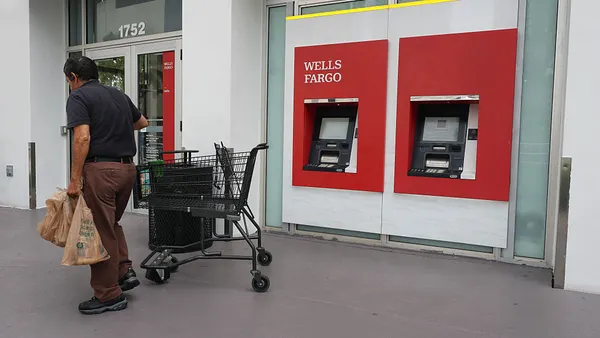Dive Brief:
- A Wells Fargo policy that allows bank accounts to remain open even after customers thought they had closed them, has caused some customers to be charged thousands of dollars in overdraft fees, according to The New York Times.
- Former and current Wells Fargo employees told the paper the charges are the result of the way the bank's computer system handles closed accounts. "An account the customer believes to be closed can stay open if it has a balance, even one below zero," the paper reported. "And each time a transaction is processed for an overdrawn account, Wells Fargo tacks on a fee."
- One employee in the bank's debt-collection department raised concerns after taking in an estimated $100,000 in overdraft fees over eight months, yet the problem has gone unaddressed by the bank, according to the Times.
Dive Insight:
The Times' report is the latest in a series of problematic issues tied to the bank's retail banking practices.
Wells Fargo is attempting to rebuild its credibility following the 2016 fake accounts scandal, where employees opened millions of fraudulent accounts as part of an incentive scheme.
The San Francisco-based bank has also drawn fire over practices in its auto insurance, mortgage and wealth management divisions, and reports suggest the bank is struggling to find a new CEO.
According to the paper, it's not clear how many customers are affected by the overdraft issue, but customers have filed complaints with the Consumer Financial Protection Bureau (CFPB), and complained on discussion sites such as Reddit and Quora.
In letters to customers, obtained by the Times, Wells Fargo said any payments made to others that are automatically withdrawn will be discontinued after the account is closed.
"But two current and two former employees said Wells Fargo had set up its computer system to keep such accounts open if they have a balance — whether positive or negative — even after the closing date," the paper reported.
The Times report follows last week's news that the bank is boosting its legal reserve from $3.1 billion to $3.9 billion, which it attributed to a variety of factors, including its retail sales practices.
Wells Fargo is also operating under strict conditions set by the Federal Reserve in response to the bank's "consumer abuses and compliance breakdowns."
The Fed announced last year that it would restrict the bank's growth until it "sufficiently improves its governance and controls."
Wells Fargo is not allowed to hold total assets above the $1.93 trillion it had at the end of 2017, a cap that remains in place through at least the end of this year, according to the Winston-Salem Journal.













